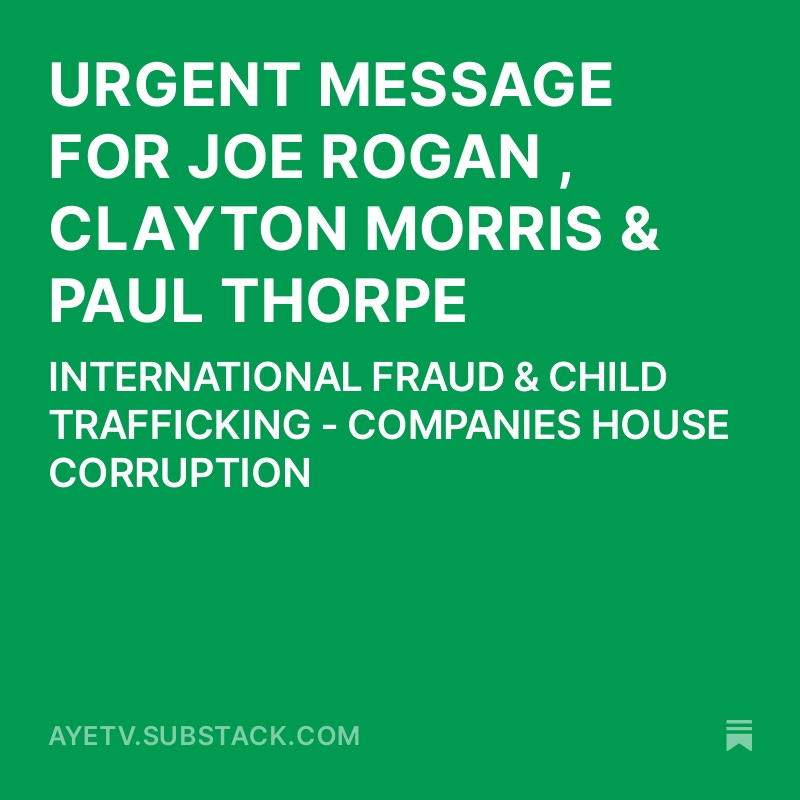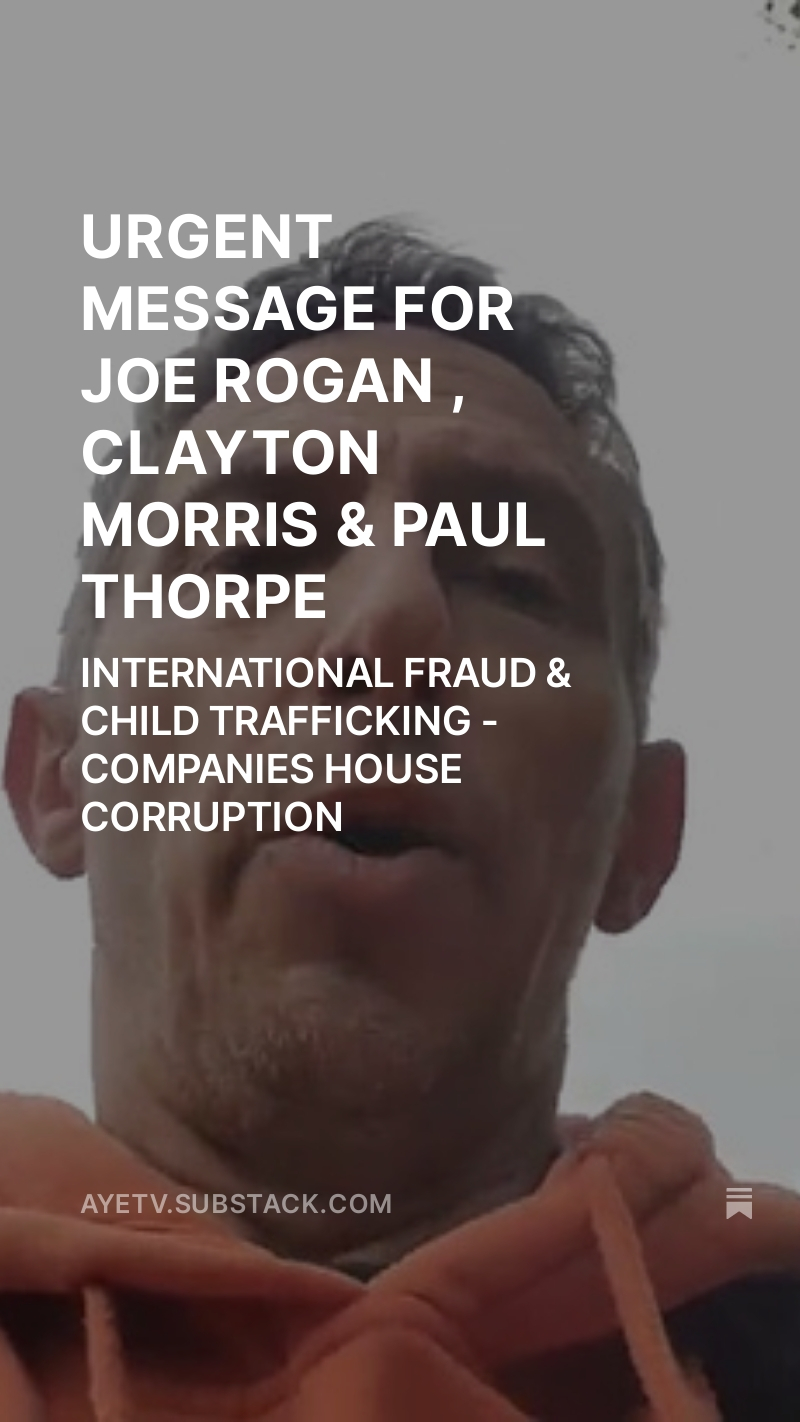●●● INTERNATIONAL FRAUD & CORRUPTION
COMPANIES HOUSE UK 🇬🇧
GOVERNMENT CHILD TRAFFICKING
#ChildTrafficking
#GaryWaterman
#whistleblower
https://open.substack.com/pub/ayetv/p/urgent-message-for-joe-rogan-clayton?r=3q3fyx&utm_campaign=post&utm_medium=web&showWelcomeOnShare=true

●●● INTERNATIONAL FRAUD & CORRUPTION
COMPANIES HOUSE UK 🇬🇧
GOVERNMENT CHILD TRAFFICKING
#ChildTrafficking
#GaryWaterman
#whistleblower
https://open.substack.com/pub/ayetv/p/urgent-message-for-joe-rogan-clayton?r=3q3fyx&utm_campaign=post&utm_medium=web&showWelcomeOnShare=true
Dr. Anthony Fauci & David Cameron Bill WELLCOME TRUST
https://rumble.com/v4si3b8-wellcome-trust-glasgow-university-biolabs-billgates-davidcameron-fauci.html
#WuhanLabs #DarpaJabs #CharlesHuang
Here’s confirmation Fauci has been working with Wellcome Trust & The Pirbright Institute (UK) (Coronavirus patent holder) for a long time.
From Wikileaks archives:
Moral: This 2009 C.I.A. propaganda document proves Coronavirus is not Fauci’s first rodeo at fooling the public with fake pandemics to enrich his Big Pharma intelligence handlers
GlaxoSmithKline (the Wellcome Trust), Sanofi, AstraZeneca and Novartis are tightly aligned with the Bill and Melinda Gates Foundation, Merial Animal Heath Institute (UK & China), The Pirbright Institute funded by DARPA (U.S.) & DERA (UK)
THE WELLCOME TRUST PARTNERED WITH GLASGOW UNIVERSITY
The Wellcome Trust Centre for Molecular Parasitology, a well-equipped unit that focuses on protozoan parasites and is particularly active in global analyses of parasite biology, including genomics, metabolomics and ecological approaches. We also have numerous research links with disease-endemic countries, in particular in Africa.
https://aim4truth.org/2020/03/21/cat-report-339/
●●●MILKY MILKY - Nigel Farage brings all the Brexit bullies to the yard
●●●
MILKY MILKY : source
Nigel Farage psy op Milky Milky Kate Middleton Juana la Loca Hogarth Michael Mosley
https://youtu.be/0VlfAEf-Vgo?si=p-Tmnt1CQINM3jSN
●●●
NIGEL FARAGE FUNDED BY DIRTY CASH FROM CRIMINAL AARON BANKS
https://www.dailymail.co.uk/news/article-9621723/Millionaire-Aaron-Banks-battles-tax-man-Appeal-Court-160-000-bill-donations-Ukip.html'>https://www.dailymail.co.uk/news/article-9621723/Millionaire-Aaron-Banks-battles-tax-man-Appeal-Court-160-000-bill-donations-Ukip.html
●●●
THE CLOWN WHO BOUGHT BREXIT.
https://dinesh.locals.com/post/2611760/influencing-elections-who-is-gerald-gunster-wtf-why-did-tucker-carlson-accept-money-t
●●●
AARON BANKS DIRTY CASH #diamondmines
https://www.dailymail.co.uk/news/article-9621723/Millionaire-Aaron-Banks-battles-tax-man-Appeal-Court-160-000-bill-donations-Ukip.html'>https://www.dailymail.co.uk/news/article-9621723/Millionaire-Aaron-Banks-battles-tax-man-Appeal-Court-160-000-bill-donations-Ukip.html
●●●
DAPHNE CARUANA GALIZIA HIT JOB
How Malta’s Assassination of Daphne Caruana Galizia Connects to an Organisation Close to Nigel Farage
The man suspected of supplying the bomb that killed the investigative journalist Daphne Caruana Galizia is part of a group which funnelled €200,000 into a European Parliament party and foundation with close links to Nigel Farage, Byline Times can reveal.
https://bylinetimes.com/2019/12/03/how-maltas-assassination-of-daphne-caruana-galizia-connects-to-an-organisation-close-to-nigel-farage/
●●●
BREXIT WAS RIGGED #CambridgeAnalytica
https://rumble.com/v2iqvzu-cambridge-analytica-saboteurs-and-british-crown-working-to-overthriw-donald.html
●●●
MILKY MILKY VIDEO
https://rumble.com/v52a0r9-nigel-farage-milky-milky-freemason-ritual.html
#MilkyMilky #NigelFarage #IsraelDiegoRivera #KnightOfMalta #LordMallochBrown #Brexit #RupertMurdoch #ElectionFraud #SouthAficanDiamondMines #SelectedNotElected #SelectionCode #Freemasonry #ArronBanks #CambridgeAnalytica






